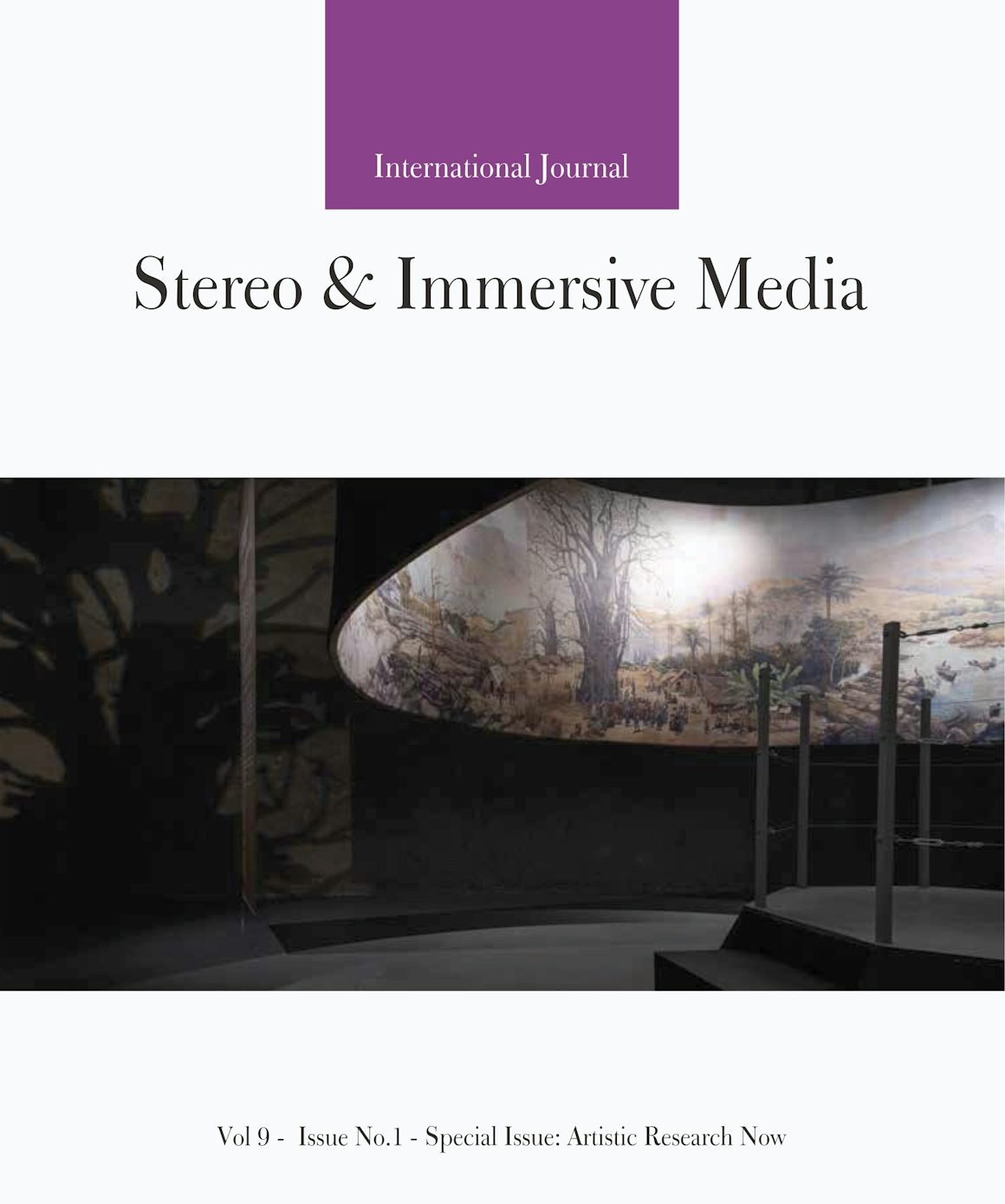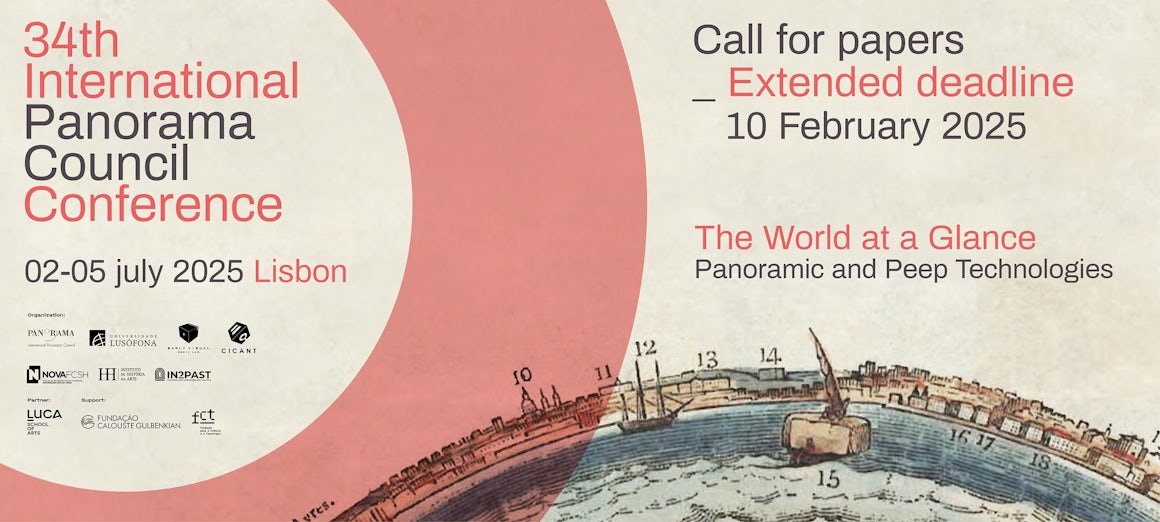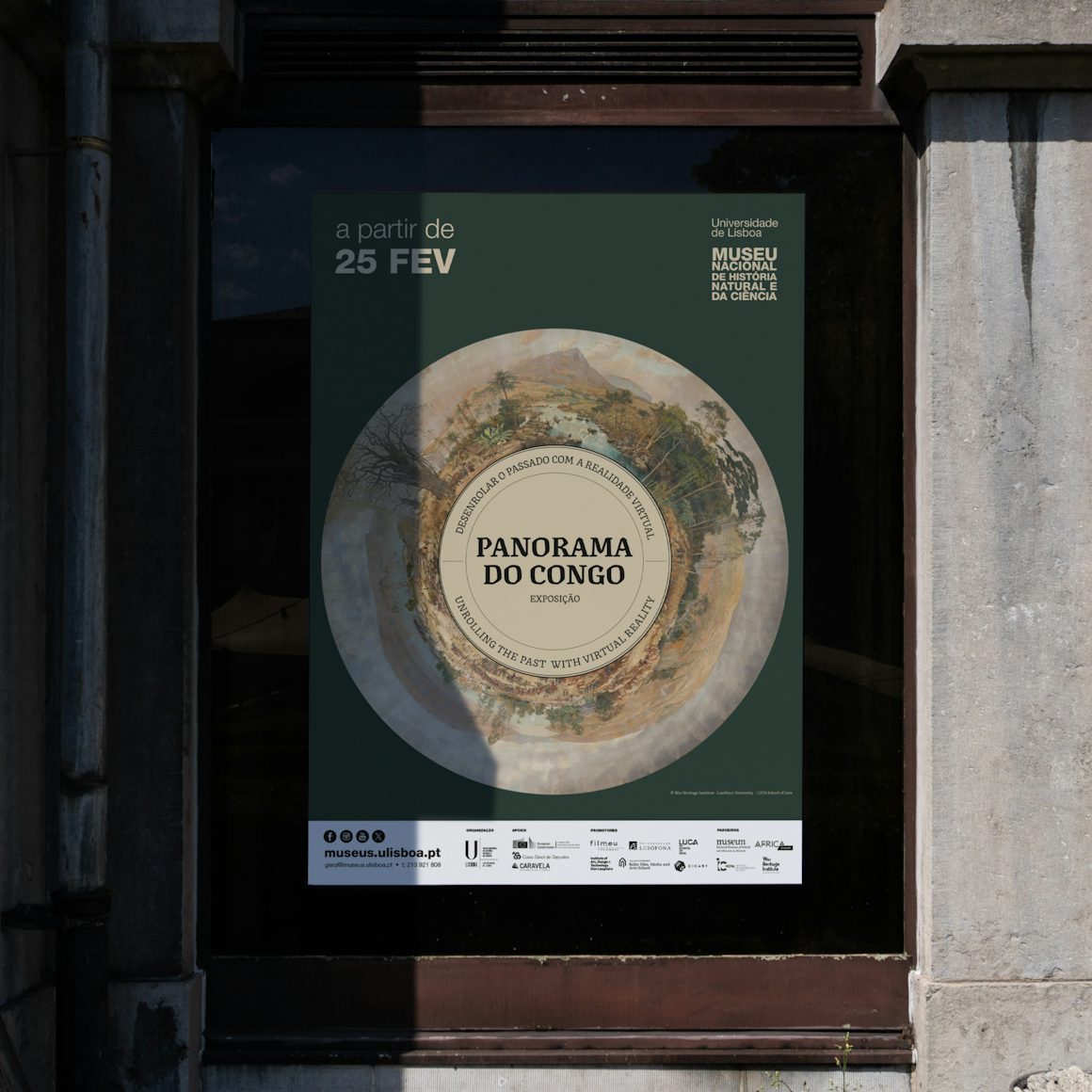Congo VR researchers contribute to Special Issue of International Journal on Stereo & Immersive Media
Victor Flores, Ana David Mendes, Linda King, and Leen Engeleen have contributed to the latest Special Issue of the International Journal on Stereo & Immersive Media: Artistic Research Now.
The article delves into the complexities surrounding the Panorama of Congo, a challenging object of inquiry due to its exceptional size and contentious historical context. Commissioned by the Belgian Ministry of Colonies in 1913 to promote the Belgian Congo, the painting raises critical questions about colonial legacies amidst contemporary debates on decolonisation. Utilising artistic research as a central methodological tool, the FilmEU RIT Congo VR project explores the broader cultural issues hidden within this heritage object. Through a transdisciplinary approach, integrating artistic, media archaeological, and postcolonial perspectives, the research investigates the imperialist implications of immersive media, particularly panoramas, and the role of Virtual Reality in reinterpreting their embedded historical narratives. Highlighting the Congo VR project, the article showcases artistic creations and installations presented in exhibitions, emphasising the convergence of artistic research and decolonial approaches within museum contexts. This research contributes to a nuanced understanding of colonial heritage and its implications for contemporary discourse on cultural representation and memory.
Access the full article at the following link: https://revistas.ulusofona.pt/index.php/stereo/article/view/9399

Extended call for papers, The 34th International Panorama Council Conference in Lisbon
Call for Proposals The World at a Glance — Panoramic and Peep Technologies
The International Panorama Council together with Lusofona University Early Visual Media Lab and the Art History Institute (IHA, NOVA-FCSH/IN2PAST) invite scholars, artists, panorama enthusiasts and visual media researchers to submit proposals for presentations that explore the theme “The World at a Glance. Panoramic and Peep Technologies.’”
Deadline for proposal submission: January 27, 2025
Please submit all abstracts and queries related to submissions to secretariat@panoramacouncil.org

The 34th International Panorama Council Conference in Lisbon, Call for Proposals
Call for Proposals The World at a Glance — Panoramic and Peep Technologies
The International Panorama Council together with Lusofona University Early Visual Media Lab and the Art History Institute (IHA, NOVA-FCSH/IN2PAST) invite scholars, artists, panorama enthusiasts and visual media researchers to submit proposals for presentations that explore the theme “The World at a Glance. Panoramic and Peep Technologies.’” This recasting of Robert Barker’s original title for his invention (1787), “Nature at a Glance” (in French, “La Nature à Coup d’ Oeil”), will explore the modern desire to experience the world visually through panoramic or peep technologies and to embark in virtual travels. Panoramas and panoramic imagery shared these early immersive experiences with (itinerant) peepshows, cosmoramas, neoramas, dioramas, and, among others, in the domestic space, zograscopes, stereoscopic photography, graphoscopes and polyoramas. These theatres of visuality were key achievements in art, education and science, fostering visual curiosity and new skills of looking. Either engaging a distant or a proximate gaze, requiring lenses or a specific vantage point on a viewing platform, these technologies made the world in all its aspects admirable and available at a glance. In addition to challenging the visual sensorium, panoramic and peep technologies often intersected and mobilized a synesthesic universe. By exploring their coexistence and intermediality, new light will be shed on the visual cultures and worldviews they promoted.
This next IPC conference in Lisbon will showcase such intersections and remediations with the exhibition The Cosmorama: The 19th-Century Hidden Travels, held at the Portuguese Cinematheque. Curated by the research project Curiositas. Peeping Before Virtual Reality, this exhibition will draw on extensive historical research that unearthed the cultural history of the European Cosmoramas. It will include physical and virtual recreations of cosmorama rooms, showcasing Panorama and Cosmorama artists such as Hubert Sattler from Salzburg.
We welcome proposals for field reports, creative presentations, media presentations, and scholarly papers of up to 20 minutes in length that focus on panoramic or/and peep technologies, their specificities, intermedialities, socio-cultural and political roles, as well as their current digital and virtual cultures, and their conservation, display and mediation challenges.
The IPC conference will present a diverse range of session topics based on the proposals, as well as workshops, round tables and visits. It will be of interest to academics, professionals, students and enthusiasts of art, visual media, art history, conservation and preservation, cultural heritage, design, history, museum practice, panorama management, restoration, virtual reality, and visual culture, as well as to thinkers and makers from other disciplines or whose work is transdisciplinary with an interest in immersive and peep media, media archaeology or any other related field.
Additional details including special workshops, keynote lectures, and a post-conference tour will be added to this page in coming weeks.
Proposals must be in Microsoft Word (.docx) format and include:
- Title of the presentation
- Author’s name, affiliation, complete mailing address and email
- 300-word abstract
- Author’s biography (150–200 words)
- 3–5 Keywords
The final conference program with abstracts and keywords will be published in the “Conference Report” section of the Panoramic and Immersive Media Studies (PIMS) Yearbook, Volume 3, 2025. Presenters will also have the opportunity to contribute full-length works for publication consideration in other sections of the PIMS Yearbook. Learn more by exploring the past call for proposals, PIMS Yearbook Call for Proposals, Volume 2, 2025, and the De Gruyter page for the PIMS Yearbook, Volume 1, 2024.
The conference will take place July 2–4, 2025, with an optional post-conference excursion on July 5.
Deadline for proposal submission: January 27, 2025
Please submit all abstracts and queries related to submissions to secretariat@panoramacouncil.org
Acceptance notifications will be emailed by February 24, 2025
For more information about the International Panorama Council and the Conference, please visit – http://panoramacouncil.org/
Conference Registration will be open March 3, 2025.

CONGO VR researchers present at the 33rd International Panorama Council Conference
10/10/2024
Four members of the CONGO VR project (FilmEU RIT) took part in the 33rd International Panorama Council Conference, held from October 2-6, 2024, at the Swiss Federal Institute of Technology (EPFL) in Lausanne, Switzerland.
Presentations from the team included:
The Afterlife of the Panorama du Congo (1913): Decolonial curation of imperial panoramas by Victor Flores, Lusófona University, Lisbon, Portugal, and Leen Engelen, LUCA School of Arts / KU Leuven, Belgium.
Congo VR: A panoptical dissidence by Ana David Mendes, Lusófona University, Lisbon, Portugal.
Illustrating a New Memory: Panorama key and virtual tour for the exhibition “Panorama of Congo” by Chiara Masiero Sgrinzatto, independent artist, Venice, Italy.

The Panorama of Congo discussed at Dossier África
09/10/2024
On June 6th, 2024, Victor Flores from Lusófona University took part in Dossier África, a weekly radio program hosted by Ângela Coutinho. The program focuses on the history of Portuguese-speaking countries and features in-depth debates on various cultural topics. During the episode, Flores discussed the groundbreaking exhibition “Panorama of the Congo: Unraveling the Past with Virtual Reality,” which is currently being showcased at the National Museum of Science and Natural History in Lisbon. The exhibition uses innovative virtual reality technology to offer visitors a unique perspective on the history and culture of the Congo.
The Panorama of Congo discussed with Matthew Stanard
24/09/2024
On June 5th, as part of the exhibition Panorama of the Congo: Unrolling the Past with Virtual Reality, the National Museum of Natural History and Science hosted a conference titled “Colonial Propaganda: How to Present it and What to Question?” by Matthew G. Stanard, a historian and specialist in colonial propaganda from Berry College (Georgia, USA). The presentation was followed by a debate with Linda King and Victor Flores, curators of the exhibition.
The Panorama of Congo presented at the Ipres 2024 conference
18/09/2024
On Thursday 19 September the digitization of the Panorama of Congo will be presented at the Ipress 2024 Conference in Ghent, Belgium. The International Conference on Digital Preservation showcases research, applications and best practices in the field of digitization of archives and heritage collections. Congo VR team member Tomas Vandecasteele will present ‘Scaling up: Photographing the ‘Panorama of Congo’, a paper prepared by Tomas Vandecasteele (LUCA), Rodrigo Peixoto (Lusofona) and Leen Engelen (LUCA). The conference is hybrid and sessions can be attended online.
Revisiting Media Heritage from the Colonial Era: the Panorama of Congo presented at the Arts and Media Archaeology Summer School
18/08/2024
On 30 August 2024, Leen Engelen (LUCA School of Arts / FILM EU) will give talk on working with colonial media heritage at the second Arts and Media Archaeology Summer School in Antwerp, Belgium. In this talk, the responsibilities that come with bringing media heritage from the colonial era back in the public space/debate are discussed. The presentation is based on the experiences of the research team working on the Panorama of Congo that explored how the panorama – that has been in storage for almost 90 years – can be recreated in VR while critically addressing and contradicting its original imperial narratives. Next to proper historical contextualization, further decolonizing efforts are needed. In the case of the Panorama of Congo, the application of artistic research methodologies in and beyond virtual reality were key means to this end.
The program and the abstract can be found here.
Digital Preservation for the Arts, Social Sciences & Humanities Conference 2024, University of Limerick, Ireland, June 27, 2024
30/06/2024
DPASSH is an international biennial conference responding to questions relating to digital preservation within the arts and social sciences. The two-day conference sought to address the complexities of long-term digital preservation in the social and cultural realms, drawing participants from academia, libraries, museums, galleries, funding bodies and policy making.
Linda King’s paper The Panorama du Congo: digitising cultural heritage and decolonising the museum, outlined the processes and public impact of this ambitious project, examining how an interdisciplinary and international team of cultural historians, educators, photographers, artists, designers, videographers, film makers, virtual reality and sound specialists, explored discourses of colonial history, the decolonisation of museums and the digitisation of cultural heritage. These findings, and how they were made accessible to the public through the exhibition Panorama of Congo: Unrolling the Past with Virtual Reality at the National Museum of Natural History and Science, Lisbon (Feb-Jun 2024), was also discussed: https://dpassh.org/
AMPS (Architecture Media Politics Society), London Heritages Conference, University of Greenwich, June 25-27, 2025
29/06/2024
Using the UNESCO World Heritage Site of Maritime Greenwich as a point of departure, this conference will explore critical questions for the heritage sector today from various disciplinary perspectives including art and architectural history, cultural studies, digital heritage, social history or landscape and urban planning.
Linda King presented her paper The Panorama du Congo: problematising colonial propaganda through the digitisation of cultural heritage, will analyse the Congo-VR project and Panorama of Congo: Unrolling the Past with Virtual Reality exhibition and open analysis to critiques of decolonisation and colonial legacies: https://amps-research.com/conference/london-heritages/
IADT Annual Teaching and Research Showcase, IADT, June 13th
13/06/2024
This event comprised two days of talks and a week-long exhibition of posters that showcase the recent research of IADT staff.
Linda King’s paper Congo-VR: FilmEU and public-facing research, addressed the Congo-VR project within the context of the FilmEU RIT initiative and IADT’s role in the consortium. She addressed issues of how research arising from the academy can create public impact and engagement and explored how the discourses of colonial history, the decolonisation of museums and the digitisation of cultural heritage that the Congo-VR project raises, have specific links to Ireland’s own history of colonisation.
FilmEU RIT presentation at AIM 2024
2024/05/30
On 29 May 2024, Érica Faleiro Rodrigues from Lusófona University in Lisbon, Portugal, alongside Diego Barajas Riaño from Tallinn University in Estonia, presented their collaborative paper, “Filming the Congo Panorama – Materialities of practice-led research,” at the Association of Moving Image Researchers (AIM) conference held in Porto, Portugal. Their research, conducted under the auspices of the FilmEU RIT, drew on their experience from December 2022, when they filmed the historic 1913 Congo Panorama in Belgium. This large canvas, crafted by artists Alfred Bastien and Paul Mathieu, depicts scenes from the Belgian Congo and has been preserved in military facilities for many decades.
The project, part of the FilmEU RIT initiative Congo VR, required meticulous planning and the utilisation of military equipment due to its complex logistics. Faleiro Rodrigues, a film director, and Barajas Riaño, a cinematographer, authored the paper which explores the intricate balance between aesthetic and technical elements in cinema, alongside a decolonising perspective on the depicted content. Their work notably contributes to the preservation and deeper understanding of colonial heritage, embodying the FilmEU Alliance’s commitment to advancing artistic research in European higher education

The Panorama of Congo discussed at ‘Conversations about…’, a programme by Lusófona University
2024/03/26
Victor Flores and Oleksandr Lyashchenko, both from Lusófona University, were interviewed about their roles and perspectives on the Congo VR project, which culminated in the exhibition The Panorama of Congo — Unrolling the Past with Virtual Reality.
Exhibition: The Panorama of Congo – Unrolling the Past with Virtual Reality
2024/02/24
Throughout their history, Panoramas have been serving imperialist propaganda. The Panorama of Congo was one such case. Commissioned to the Belgian painters Alfred Bastien and Paul Mathieu for the Ghent International Exhibition in 1913. The painting, which was circular and measured 115 meters in length and 14 meters in height, aimed to generate interest in the Belgian colony amongst young people. By portraying the Congo as an African Eden, it was meant to erase the atrocities that had been committed against the Congolese people in the so-called ‘Congo Free State’ (1885-1908), which was the private property of King Leopold II. For all its controversy, the Panorama du Congo was forgotten in museum storages for almost a century.
Panorama of the Congo. Unravelling the past with virtual reality.
Temporary exhibition
25 February – 16 June 2024
Allosaurus Room | Museum of Natural History Lisboa
More info on museus.ulisboa.pt

This exhibition is the outcome of a research project (CONGO VR – FilmEU RIT) that photographed and unrolled the Panorama of Congo to reinterpret it in Virtual Reality through its violent historical context and interventions by artists from the Congolese diaspora such as Kongo Astronauts (Eléonore Hellio & Michel Ekeba), Deogracias Kihalu, Lukah Katangila, Hadassa Ngamba and Castélie Yalombo. The painting is part of the collection of the War Heritage Institute. The exhibition seeks to bring the Panorama of Congo into the debates on decolonization and decolonial thinking, raising questions related to colonial heritage, memory and identity.
The research project Congo VR – Decolonising the Panorama of Congo: A Virtual Heritage Artistic Research is one of the projects funded by FILMEU RIT – Research | Innovation | Transformation project, European Union GRANT NUMBER: 101035820 H2020-IBA-SwafS-Support-2-2020.
